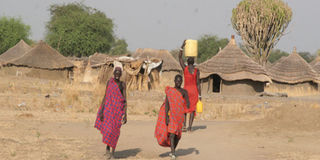No smoke without fire: grim signs of war in South Sudan

Padak village in Jonglei state of South Sudan. Photo/FILE
From the air, the vast lands of South Sudan's conflict-wracked Jonglei state look peaceful before the white plumes of smoke come into view: thatch huts still burning from an attack.
"There are houses on fire," the captain of the small plane shouts, as he swoops down low towards billowing clouds of smoke spiralling from a thatch hut for a closer look.
Nearby, two grey circles -- looking like the remains of giant cigarettes stubbed out in a village -- are all that is left of homes already razed to the ground.
Just out of reach of the flames, around a dozen men in dark green uniforms scan the sky for the plane above.
Elsewhere, more than 100 men in similar green battledress form a snaking line through the bush, determinedly marching south.
Tit-for-tat cattle raids and reprisal killings are common in this grossly under-developed state, awash with guns left over from almost two decades of civil war.
But the latest upsurge in fighting that began around a week ago is of a different scale and nature. Local government officials have reported columns of hundreds -- if not thousands -- of gunmen in a tribal militia fighting their way towards the heartland of a rival community.
Lou Nuer gunmen from northern Jonglei are heading south towards Pibor, an area of their rivals, the Murle.
Pibor County Commissioner Joshua Konyi, speaking from the impoverished town earlier this week, said Murle civilians were fleeing ahead of the gunmen, fearing a repeat of previous such attacks.
South Sudan's rebel-turned-official army has also been fighting in the region to crush a rebellion led by David Yau Yau, who comes from the Murle people, since 2010.
US State Department officials said this week they were "deeply disturbed by mounting reports of abuse of civilians, including targeted killings, rape (and) beatings."
European ambassadors in Juba warned Saturday that the clashes risked spiralling into "outright ethnic conflict".
From the air, flying over the thick green bush broken up by simmering swamps reflecting the fierce sun, signs of actual fighting are hard to see.
A few homesteads burn, while in other villages, conical straw and mud huts lie deserted.
Herds of cattle, upon which the people here depend for their livelihood, are nowhere to be seen -- either hidden in surrounding bush or taken by advancing raiding parties.
This isolated and swampy state, about the size of Austria and Switzerland combined, has limited mud roads that are often impassable for months during heavy rains.
Age-old ethnic rivalries
The latest clashes follows bitter fighting in May, when soldiers and other gunmen looted UN and aid agency stores in Pibor, including a key hospital.
Government officials in Lou Nuer areas in northern Jonglei deny that young men have set off to fight, but past clashes followed a similar pattern.
In Walgak, where Yau Yau's rebels massacred over 100 people in February, local commissioner Koang Rambang Chol dismisses reports that the Lou Nuer youth have left.
"This is farming season," he said, before adding only that perhaps "some of the youth will be patrolling the borders of our areas."
But in Akobo, another Lou Nuer settlement in northern Jonglei, one aid worker, who asked not to be named, said the young men had gone.
"The people here say the youth have gone, and they're fighting the Murle near Pibor."
Ethnic rivalries are age-old here, but were exacerbated by the 1983-2005 war with Khartoum, which armed and pitted communities against each other.
Recent reports echo attacks in December 2011, when some 8,000 Lou Nuer marched south, killing and looting in what they said were reprisals for earlier attacks and cattle raids by Murle fighters.
Rights groups and aid agencies recorded a string of atrocities: babies were burned while women were attacked, raped or abducted.
Like this time, according to reports, fighters were armed with semi-automatic rifles, machineguns and rocket-propelled grenades.
The United Nations later estimated that more than 600 people were massacred, although local officials reported the death toll to have been far higher.
UN peacekeepers have small bases here, but with limited impact.
Ground patrols were scaled back after five UN peacekeepers and seven UN civilian workers were killed in an ambush in April near Pibor.
Low-level aerial patrols have been less frequent since government soldiers shot down a UN helicopter in December. They said they thought it was from Sudan, whom Juba regularly accuses of arming rebels as a proxy force.
So the peacekeepers rarely venture far outside their fortified posts, saying this week they were "not in an immediate position" to confirm details about any clashes.
But even a brief flyover of this vast region shows the houses are burning and the armed men are marching.




